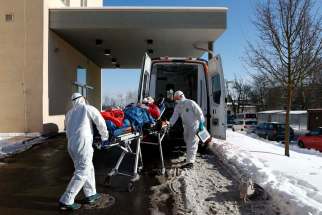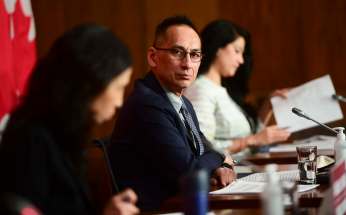Manitoba should consider delaying second doses of COVID vaccine
Read this article for free:
or
Already have an account? Log in here »
To continue reading, please subscribe:
Monthly Digital Subscription
$0 for the first 4 weeks*
- Enjoy unlimited reading on winnipegfreepress.com
- Read the E-Edition, our digital replica newspaper
- Access News Break, our award-winning app
- Play interactive puzzles
*No charge for 4 weeks then price increases to the regular rate of $19.00 plus GST every four weeks. Offer available to new and qualified returning subscribers only. Cancel any time.
Monthly Digital Subscription
$4.75/week*
- Enjoy unlimited reading on winnipegfreepress.com
- Read the E-Edition, our digital replica newspaper
- Access News Break, our award-winning app
- Play interactive puzzles
*Billed as $19 plus GST every four weeks. Cancel any time.
To continue reading, please subscribe:
Add Free Press access to your Brandon Sun subscription for only an additional
$1 for the first 4 weeks*
*Your next subscription payment will increase by $1.00 and you will be charged $16.99 plus GST for four weeks. After four weeks, your payment will increase to $23.99 plus GST every four weeks.
Read unlimited articles for free today:
or
Already have an account? Log in here »
Hey there, time traveller!
This article was published 19/02/2021 (1753 days ago), so information in it may no longer be current.
Manitoba’s public health officials will have some tough decisions ahead as evidence mounts that delaying the second dose of the COVID-19 vaccine may save more lives than following existing immunization protocols.
It’s been known for some time that the efficacy of both the Pfizer-BioNTech and Moderna vaccines increases over time after the first shot. Clinical trials for both showed the level of protection rises almost to levels attained after the second jab. What’s less clear is how long that protection lasts and what, if any, are the long-term implications of delaying the second dose.
That evidence is what led Manitoba in late December to follow the lead of other provinces and not hold back second doses for followup injections. Manitoba was holding back half its doses to ensure they were available for the second shot, 21 to 28 days later (the period recommended by the manufacturers). They now only give the first shot if a second dose is either on hand or is expected to be shipped soon after.

Since then, there’s been a growing consensus in the scientific community that the benefits of getting more vaccines into arms quicker, by delaying second doses, may outweigh any potential harm in doing so.
Canada’s deputy chief public health officer, Dr. Howard Njoo, said Thursday early data show a single dose may provide almost as much protection as the first.
Dr. Danuta Skowronski from the British Columbia Centre for Disease Control and Dr. Gaston De Serres from the Quebec National Institute of Public Health made the case for delaying second doses in a recent letter published in the New England Journal of Medicine.
Canada’s National Advisory Committee on Immunization recommends sticking with the prescribed period for second doses when possible. But they also said waiting six weeks could be beneficial.
Some of the “real-world” information that’s emerging is beginning to support that argument.
There’s little evidence of safety concerns around delaying second doses. The main question is how long protection lasts before a second dose is given.
A recent study of health-care workers in Israel, published in the Lancet, showed efficacy rates of up to 85 per cent 15 to 28 days after the first dose.
In Quebec, where government is delaying second doses for up to 90 days, a recent study showed the vaccine was 80 per cent effective among health-care workers after 14 days.
Manitoba has not released any similar studies. Instead, the province has been politicizing the debate, claiming it won’t “sacrifice safety for speed,” when deciding when second doses should be given. The inference is that other jurisdictions are compromising safety by not following the manufacturer-recommended timeline for second doses.
That’s not based on science; it’s political rhetoric.
There’s little evidence of safety concerns around delaying second doses. The main question is how long protection lasts before a second dose is given. That can be addressed if second doses are given within a reasonable period of time (no one is advocating eliminating the second dose altogether).
There is strong evidence that the longer it takes to vaccinate high-risk people, even with one dose, the more deaths there will be. Public health officials know that even one dose of the vaccine will likely prevent serious illness in high-risk people, particularly those over the age of 70.
When that’s weighed against whatever minor risks may be associated with delaying second doses (especially given the growing body of evidence on first-dose efficacy), Manitoba’s position is becoming increasingly untenable.
That’s especially true given the threat of a new, more contagious variant that has entered the province (there are now four confirmed cases of the U.K.-based variant in Manitoba).
Canada will not have enough vaccine supply to create herd immunity until at least the summer, maybe later. The goal between now and then should be to protect as many vulnerable people, primarily those over 70, as possible. If the science shows the best way to do that is by delaying second doses, Manitoba should set politics aside and give that serious consideration.
tom.brodbeck@freepress.mb.ca

Tom has been covering Manitoba politics since the early 1990s and joined the Winnipeg Free Press news team in 2019.
Our newsroom depends on a growing audience of readers to power our journalism. If you are not a paid reader, please consider becoming a subscriber.
Our newsroom depends on its audience of readers to power our journalism. Thank you for your support.








